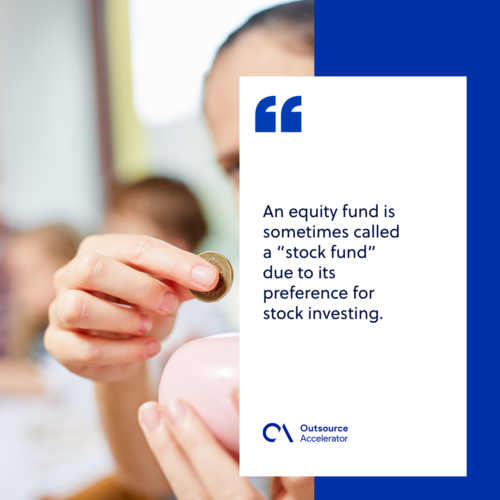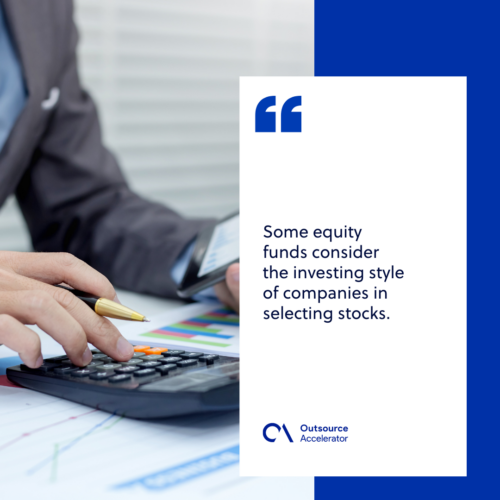Equity fund
Definition
What is an equity fund?
An equity fund is a type of mutual fund investing primarily in stocks. An equity fund is sometimes called a “stock fund” due to its preference for stock investing.
There are different types of equity funds. Each fund is categorized according to market capitalization, investment approach, and geography.

Types of equity funds according to focus
Here are the most common types of equity funds.
Market cap equity funds
Equity mutual funds sorted according to market caps, such as small-cap or large-cap funds, are size indicators of the company they are invested in rather than the size of the mutual fund.
To determine a company’s market cap, its current number of outstanding stocks is multiplied by a single share’s present market price. For example, if a company has 100,000 shares outstanding and has a share price of USD 100, its market cap value will be USD 10 million.
Small-cap funds
Small-cap funds typically invest in companies with less than USD 2 billion in market cap value. However, the exact value delineation of small-cap funds varies among brokerage firms.
The smaller companies categorized under small-cap equity funds are generally in the early stages of business operations. Thus, they are presumed to have the potential for significant growth but lack the financial stability of larger companies.
Because small-cap funds invest in less stable companies, these funds are also more volatile.
Mid-cap funds
Mid-cap funds are invested in companies with market values of USD 2 billion up to USD 10 billion.
Similar to small-cap funds, mutual funds invested in mid-cap companies have more growth potential. Unlike small-cap company investments, however, mid-cap company investments are less vulnerable to volatility due to being relatively more established.
Mid-cap funds make great investments for investors who want better returns with minimized risks and disadvantages.
Large-cap funds
Companies with more than USD 10 billion in market cap are classified as large-cap. The large size of companies in this category often results in large-cap funds being forced to own the same companies comprising major indices.
While large-cap funds are helpful investment tools for long-term investors, they aren’t recommended for those seeking to beat the market.
Investment approach
Some equity funds consider the investing style of companies in selecting stocks. Fund managers focused on investing style utilize four major methodologies when choosing which company to invest in:
- Value strategy. The fund manager will invest in companies showing growth potential and are presently available at a lower price.
- Growth strategy. The fund manager will invest in companies with proven and sustained growth and profit records.
- Bottom-up strategy. The fund manager will invest in a set of well-researched stocks, regardless of the these stocks’ origin sector.
- Top-down strategy. The fund manager will choose a sector first before deciding which stocks to purchase within that sector.

Geography
Equity funds categorized according to geographical location work similar to diversified portfolios. These funds can range from being allocated to different regions in a country to different countries in a region.
There are three classifications of geography-based equity funds:
- Country/regional funds. These are funds invested solely within the investors’ country or region of origin. For example, an equity fund invested only within the U.S. is a country equity fund, while one that has an investment throughout North America is a regional fund.
- International equity funds. These funds are exclusively invested in stocks outside the investors’ home country.
- Global/worldwide equity funds. These funds are invested globally, including within the investors’ home country. Global equity funds generally don’t discriminate between international and domestic stocks; instead, these funds are allocated as dictated by the fund manager.
How does an equity fund work?
Equity funds work by investing money pooled by multiple investors into different stocks and businesses. The investors then stand to gain or lose as stockholders normally would.
However, equity fund shareholders stand to lose less than typical shareholders as their losses are spread among the other co-investors. Likewise, the profit gained from the fund’s investments is divided among the investors as dividends after deducting the fee charged by the fund manager.
Is an equity fund a good investment?
Investing in equity funds gives investors various advantages:
- Equity funds reduce risks due to being more diverse than individual stocks investments.
- Less-experienced investors benefit from having professionals manage their equity funds investments.
- Investors can easily liquidate their investments if needed.
- Equity funds are more accessible to investors with smaller resources.







 Independent
Independent




